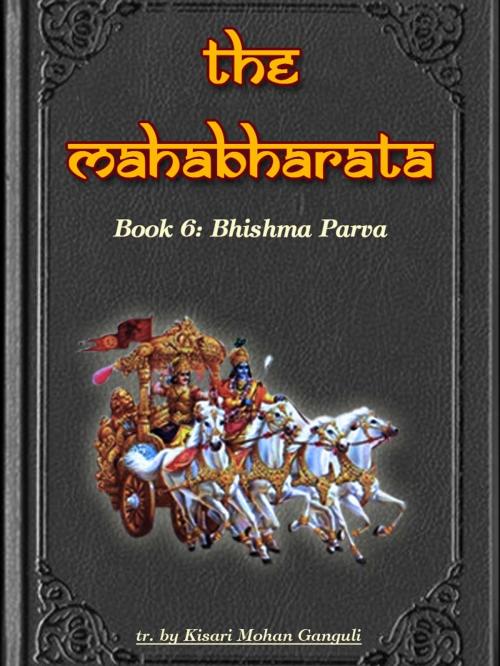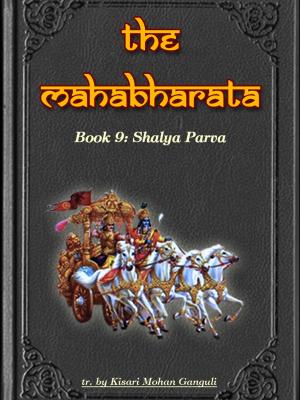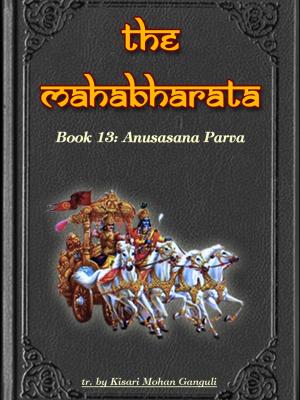The Mahabharata, Book 6: Bhishma Parva
Nonfiction, Religion & Spirituality, Eastern Religions, Hinduism, Inspiration & Meditation, Spirituality, History| Author: | Kisari Mohan Ganguli | ISBN: | 1230000036131 |
| Publisher: | AppsPublisher | Publication: | December 3, 2012 |
| Imprint: | Language: | English |
| Author: | Kisari Mohan Ganguli |
| ISBN: | 1230000036131 |
| Publisher: | AppsPublisher |
| Publication: | December 3, 2012 |
| Imprint: | |
| Language: | English |
The Mahabharata, Book 6: Bhishma Parva
Kisari Mohan Ganguli, tr.
Om! Having bowed down to Narayana, and Nara the foremost of male beings, and the goddess Saraswati also, must the word Jaya be uttered.
It is of immense importance to the culture of the Indian subcontinent, and is a major text of Hinduism. Its discussion of human goals (artha or purpose, kama or pleasure, dharma or duty/harmony, and moksha or liberation) takes place in a long-standing tradition, attempting to explain the relationship of the individual to society and the world (the nature of the 'Self') and the workings of karma.
The object of a translator should ever be to hold the mirror upto his author. That being so, his chief duty is to represent so far as practicable the manner in which his author's ideas have been expressed, retaining if possible at the sacrifice of idiom and taste all the peculiarities of his author's imagery and of language as well. In regard to translations from the Sanskrit, nothing is easier than to dish up Hindu ideas, so as to make them agreeable to English taste. But the endeavour of the present translator has been to give in the following pages as literal a rendering as possible of the great work of Vyasa. To the purely English reader there is much in the following pages that will strike as ridiculous. Those unacquainted with any language but their own are generally very exclusive in matters of taste. Having no knowledge of models other than what they meet with in their own tongue, the standard they have formed of purity and taste in composition must necessarily be a narrow one. The translator, however, would ill-discharge his duty, if for the sake of avoiding ridicule, he sacrificed fidelity to the original. He must represent his author as he is, not as he should be to please the narrow taste of those entirely unacquainted with him. Mr. Pickford, in the preface to his English translation of the Mahavira Charita, ably defends a close adherence to the original even at the sacrifice of idiom and taste against the claims of what has been called 'Free Translation,' which means dressing the author in an outlandish garb to please those to whom he is introduced.
This book of the Mahabharata is important for two reasons. First of all, it contains the Bhagavad Gita, the best-known Hindu sacred text. Secondly, this book describes the start of the enormous battle which is the center-piece of the work, specifically the first ten days of conflict, up to the fate of the hero Bhishma.
The Bhishma Parva starts with an overture of apocalyptic and unnatural portents. It then immediately digresses into a treatise on geography and natural history--one of several texts which the great epic accreted over time.
After this comes the Bhagavad Gita, which unlike some of the other digressions, is a good thematic fit in the narrative. Arjuna, facing a battle in which he will have to fight many of his immediate relatives, is understandably hesitant to fight. The Avatar Krishna then proceeds to explain to Arjuna why he must fulfill his duty as a warrior, and how he can emerge from this spiritual crisis of conscience with a clean slate. This text deals with the contradictions of living a devotional life in an imperfect world. Even non-Hindus have found the Gita meaningful for this reason. Then Krishna reveals to Arjuna his divine form; this section is one of the best attempts to describe the indescribable ever written.
The Mahabharata, Book 6: Bhishma Parva
Kisari Mohan Ganguli, tr.
Om! Having bowed down to Narayana, and Nara the foremost of male beings, and the goddess Saraswati also, must the word Jaya be uttered.
It is of immense importance to the culture of the Indian subcontinent, and is a major text of Hinduism. Its discussion of human goals (artha or purpose, kama or pleasure, dharma or duty/harmony, and moksha or liberation) takes place in a long-standing tradition, attempting to explain the relationship of the individual to society and the world (the nature of the 'Self') and the workings of karma.
The object of a translator should ever be to hold the mirror upto his author. That being so, his chief duty is to represent so far as practicable the manner in which his author's ideas have been expressed, retaining if possible at the sacrifice of idiom and taste all the peculiarities of his author's imagery and of language as well. In regard to translations from the Sanskrit, nothing is easier than to dish up Hindu ideas, so as to make them agreeable to English taste. But the endeavour of the present translator has been to give in the following pages as literal a rendering as possible of the great work of Vyasa. To the purely English reader there is much in the following pages that will strike as ridiculous. Those unacquainted with any language but their own are generally very exclusive in matters of taste. Having no knowledge of models other than what they meet with in their own tongue, the standard they have formed of purity and taste in composition must necessarily be a narrow one. The translator, however, would ill-discharge his duty, if for the sake of avoiding ridicule, he sacrificed fidelity to the original. He must represent his author as he is, not as he should be to please the narrow taste of those entirely unacquainted with him. Mr. Pickford, in the preface to his English translation of the Mahavira Charita, ably defends a close adherence to the original even at the sacrifice of idiom and taste against the claims of what has been called 'Free Translation,' which means dressing the author in an outlandish garb to please those to whom he is introduced.
This book of the Mahabharata is important for two reasons. First of all, it contains the Bhagavad Gita, the best-known Hindu sacred text. Secondly, this book describes the start of the enormous battle which is the center-piece of the work, specifically the first ten days of conflict, up to the fate of the hero Bhishma.
The Bhishma Parva starts with an overture of apocalyptic and unnatural portents. It then immediately digresses into a treatise on geography and natural history--one of several texts which the great epic accreted over time.
After this comes the Bhagavad Gita, which unlike some of the other digressions, is a good thematic fit in the narrative. Arjuna, facing a battle in which he will have to fight many of his immediate relatives, is understandably hesitant to fight. The Avatar Krishna then proceeds to explain to Arjuna why he must fulfill his duty as a warrior, and how he can emerge from this spiritual crisis of conscience with a clean slate. This text deals with the contradictions of living a devotional life in an imperfect world. Even non-Hindus have found the Gita meaningful for this reason. Then Krishna reveals to Arjuna his divine form; this section is one of the best attempts to describe the indescribable ever written.















